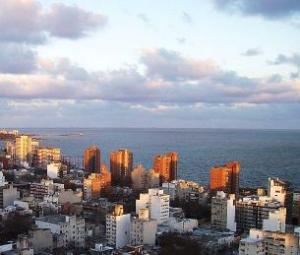When it comes to slowing the spread of HIV/AIDS, the imperatives of the drug war are a hindrance, not a help, a new report from the Global Commission on Drugs finds. There is a better way, the group says.
The Supreme Court has held that people "in the pipeline" -- convicted but not yet sentenced when Fair Sentencing Act reforms took effect -- on federal crack cocaine charges are entitled to be sentenced under the lesser penalties created by the act. Thousands could get sentence cuts.
Following the lead of some of its suburbs, Chicago has decriminalized the possession of less than 15 grams of marijuana for adults.
NYPD refuses to stop charging people with misdemeanor marijuana possession after stopping and frisking them and forcing them to empty their pockets so they can be charged with "public possession," so now the Legal Aid Society is suing to make them knock it off.
The left-leaning Uruguayan government says it will introduce a bill that would give it a monopoly on legal marijuana sales.
Supervised injection sites are coming to Denmark, and so are broader "drug consumption rooms" where heroin and cocaine can be smoked or snorted. A new law takes effect July 1.
DrugWarFacts.org, a publication of Common Sense for Drug Policy, is an in-depth compilation of key facts, stats and quotes on the full range of drug policy issues, excerpted from expert publications on the subjects. The Chronicle is running a series of info items from DrugWarFacts.org, and we encourage you to check it out.
New Hampshire Gov. John Lynch has vetoed a medical marijuana bill--again. Now, it's up to the legislature to see if it can muster the votes to override the veto.
An effort to override Gov. John Lynch's veto of a medical marijuana bill succeeded in the House but fell short in the Senate.
The feds continue to play hardball in California and local elected officials across the state are grappling with the issues. Meanwhile, Vermont moves ahead on dispensaries while New Hampshire's medical marijuana bill can't overcome a gubernatorial veto, and that's not all.
A decriminalization bill has passed the New Jersey Assembly, but faces an uphill battle to overcome a veto threat from Gov. Christie.
A scandal that keeps on giving in Florida, a pair of bad apple deputies in LA get their just rewards, a crooked NYPD cop gets his, too, and much, much more.
On Tuesday, as the UN's global drug prohibition bureaucracy marked its annual International Day Against Drug Abuse and Illicit Trafficking and UN Office on Drugs and Crime head Yuri Fedotov blamed hard drug use for "bringing misery to thousands of people, insecurity, and the spread of HIV," a group of leading international voices offered a starkly contrasting perspective, arguing instead that is the failures and consequences of global drug prohibition that are driving the spread of HIV/AIDS and other blood-borne diseases among drug users.

Commission members Michel Kazatchkine, Ruth Dreifuss, and Ilana Szabo at London press conference
Those voices, gathered together as the
Global Commission on Drug Policy, include six former presidents from around the world, public health experts, and socially conscious entrepreneurs such as Sir Richard Branson. They took the opportunity of global anti-drug day to issue a report,
The War on Drugs and HIV/AIDS: How the Criminalization of Drug Use Fuels the Global Pandemic that directly condemns the drug war as a failure and calls for immediate, fundamental reforms of the global drug prohibition regime to slow the spread of HIV and reduce other drug war harms.
There are an estimated 33 million people worldwide infected with HIV, and outside sub-Saharan Africa, injection drug use accounts for one-third of new infections. The situation is particularly bad in Russia and other countries in the former Soviet Union and East Bloc that continue to take harsh drug war approaches to drug use despite the evidence before their own eyes. In Russia, nearly one in a hundred adults is now infected with HIV.
But it's not just the Russian sphere where policymakers ignore the evidence. The report also cites China, Thailand, and the US, where Congress recently reinstated a longstanding ban on the use of federal funds for syringe exchange programs. In countries that have adopted evidence-based HIV prevention programs, such as Switzerland and Portugal, injection drug use-related HIV infections have nearly been eliminated.
According to the report, drug prohibition and the
criminalization of drug users spurs the spread of HIV through the following means:
- Fear of arrest drives persons who use drugs underground, away from HIV testing and HIV prevention services and into high-risk environments.
- Restrictions on provision of sterile syringes to drug users result in increased syringe sharing.
- Prohibitions or restrictions on opioid substitution therapy and other evidence-based treatment result in untreated addiction and avoidable HIV risk behavior.
- Deficient conditions and lack of HIV prevention measures in prison lead to HIV outbreaks among incarcerated drug users.
- Disruptions of HIV antiretroviral therapy result in elevated HIV viral load and subsequent HIV transmission and increased antiretroviral resistance.
- Limited public funds are wasted on harmful and ineffective drug law enforcement efforts instead of being invested in proven HIV prevention strategies.
"The Global Commission is calling on all entities to acknowledge and address the causal links between the war on drugs' criminalization of drug use and drug users and the spread of HIV/AIDS," commission member Michel Kazatchkine, the former executive director of the Global Fund to Fight AIDS, Tuberculosis, and Malaria told a London press conference. "For people who inject drugs and their sex partners, the AIDS epidemic continues to be a public health emergency."
"It is so clear now that there is a relation between repressive drug policies and the spread of HIV/AIDS," said former Colombian President Cesar Gaviria. "If we don't get people into the health system without fear, it will be very difficult to do treatment and prevention."

Commission member Sir Richard Branson at "Atlantic Exchange" drug policy discussion, Washington, DC, March 2012
"I have long thought the war on drugs did more harm than good, and the commission's report put the data behind those beliefs," said Branson. "The war on drugs is not stopping drug use, and it also contributes significantly to the AIDS epidemic by driving users into the shadows. As an entrepreneur, if my business was failing for 40 years, I would close it down. Refusing to implement public health measures to reduce HIV and protect people with a drug problem is nothing short of criminal."
Branson and the other commissioners made some concrete recommendations for action in the report. Those include:
- Push national governments to halt the practice of arresting and imprisoning people who use drugs but do no harm to others.
- Measure drug policy success by indicators that have real meaning in communities, such as reduced rates of transmission of HIV and other infectious diseases, fewer overdose deaths, reduced drug market violence, fewer individuals incarcerated and lowered rates of problematic substance use.
- Respond to the fact that HIV risk behavior resulting from repressive drug control policies and under-funding of evidence-based approaches is the main issue driving the HIV epidemic in many regions of the world.
- Act urgently: The war on drugs has failed, and millions of new HIV infections and AIDS deaths can be averted if action is taken now.
"The AIDS epidemic is a harsh and brutal teacher that obliges us to take a scientific approach to deal with sex workers and drug addicts," said former Swiss President and commission member Ruth Dreifuss. "Politicians have to inform citizens of the benefits, risks, and failures of drug policy, and politics has to take responsibility for policy change. Public health has to be at least as important as criminalizing the drug traffic," she told the press conference.
"Addicted injecting drug users is one of the main sources of the spread, and not all of them will achieve abstinence," said Dreifuss. "Substitution therapies can take people away from street drug dealers and violence. For some, the provision of medical heroin is necessary to allow them to abandon criminal activities and overcome marginalization. It's possible to implement these large scale programs at low costs with high benefits," she argued.
"For others, harm reduction measures are necessary in order to avoid the spread of HIV/AIDS and other bloodborne disease. Needle exchange programs, free condoms, safe consumption rooms all not only save the lives of drug users but protect the whole population," Dreifuss explained. "We need the full spectrum of these measures for those in prison, too, who are at more risk for HIV infections."
Dreifuss touted her own country's experience as a model. Faced with mounting injection drug use, Switzerland eventually went the route of supervised injection sites and opioid maintenance, including heroin maintenance.
"Our experience is that it works," she said. "The police protect the injection rooms from dealers. The four pillar policy [prevention, treatment, harm reduction, enforcement] has been broadly accepted by our citizens and the spread of HIV/AIDS is under control."
Even within the constraints imposed by the global drug prohibition regime, countries can still take action to mitigate the drug war's role in the spread of infectious disease, she said.
"It is possible for countries to adopt effective harm reduction measures within existing drug laws," Dreifuss argued. "The decriminalization of drug use is the first step, and the second step is to determine what type of market can drive out dealers. The war on drugs has failed to reduce supply or demand; let us replace prohibition with regulation and avoid jeopardizing public health and harm reduction policies with inefficient measures."
"Our message is that prohibitionist law enforcement has failed in its goals of eradicating drugs and protecting people's health," said Kazatchkine. "Illegal drugs have become cheaper and more available and HIV and other health risks have increased. Prohibitionist policies have been shifting the market to stronger drugs and led to a war on users with numerous human rights abuses, police harassment, violence, extortion. The fear of police and stigma is driving users underground and away from access to information, care, and medical services," he warned.
"One cannot improve health through war," he concluded. "This is an epidemic among people who inject that we can actually control. If we are to have a chance at reducing the transmission of AIDS, we need to open up and change our ways."
The Global Commission on Drugs has laid out the problem and showed us the path to fix it. Now, it is up to our political leadership to act accordingly, and it is up to us to ensure that it does.
back to top
The US Supreme Court ruled last Thursday that decreased crack cocaine sentences approved by Congress in 2010 also apply to people who were convicted but not yet sentenced when the law took effect. The decision could result in reduced sentences for thousands of so-called "pipeline" federal crack cocaine defendants.
Congress passed the Fair Sentencing Act and President Obama signed it into law after years of complaints about the sentencing disparities between crack and powder cocaine and the racial impact of those disparities. Under laws passed in the late
1980s, it took 100 times as much powder cocaine to generate mandatory minimum prison sentences as it did for crack cocaine. The act reduced the quantity disparity to 18:1.
The decision in two cases of men convicted on federal crack charges but sentenced after the act became law came on a narrow 5-4 vote. The two cases were consolidated in a single ruling in
Dorsey v. United States.
In one case, Edward Dorsey was arrested in 2008 and pleaded guilty in July 2010 to possessing 5.5 grams of crack with the intent to distribute. He was sentenced to a mandatory minimum 10 years; under the new law, his sentence would likely have been around four years.
In the other case, Corey Hill was convicted in 2009 of selling 53 grams of crack in 2007 and sentenced to 10 years in prison; under the new law, his sentence would have been around five years.
Federal appeals court split on whether the new law should be applied retroactively, prodding the Supreme Court to take up the cases and bring clarity to the issue.
The court split in what has become almost standard for the Roberts court. All four liberal justices weighed in on the side of extending the sentencing reductions and were joined by swing justice Anthony Kennedy. The court's four staunch conservatives all dissented.
Sentencing reform advocates welcomed the ruling.
"We are thrilled with the court's decision," said Julie Stewart, executive director of
Families Against Mandatory Minimums, which had filed a friend of the court brief in the case. "We considered it patently unjust to make these pipeline defendants serve longer sentences under a scheme that was completely repudiated by Congress. As the court found, doing so would have flouted the will of Congress, which called on the US Sentencing Commission to lower crack cocaine sentences 'as soon as practicable' after the Fair Sentencing Act was signed into law. Especially exciting is the fact that Justice
Breyer's opinion for the majority recognized that people who were sentenced after August 3, 2010 to an old law sentence are eligible to seek relief in federal courts."
back to top
The Chicago City Council voted overwhelmingly Wednesday to decriminalize the possession of up to 15 grams of marijuana -- a little more than a half ounce. The measure, which had the support of Mayor Rahm Emanuel, passed on a lopsided 42-3 vote.

The winds of change are blowing in the Windy City (wikimedia.org)
The city now joins more than 90 other Illinois localities that have decriminalized pot possession, including several in suburban Cook County. Fifteen states have also reduced penalties for pot possession, either by removing the possibility of jail time for misdemeanor possession, or by outright decriminalizing it by making it a civil infraction, or, in the case of Alaska, not making possession at home an offense at all.
Under the measure, adults caught in possession of 15 grams or less would not be arrested, but would be cited and would face fines of $200 to $500 and up to 10 hours of community service. Under the existing ordinance, possession is a misdemeanor punishable by up to six months in jail.
Police could, however, still arrest those cannot present identification or who present a threat to public safety. Also, people caught smoking marijuana or possessing it on school grounds or in parks would still be arrested, as would minors.
Chicago police arrested more than 18,000 people on small-time (less than 10 grams) marijuana possession charges last year. Each arrest involves about four officers -- two to arrest and two to transport -- said a statement from the mayor's office last week.
"These arrests tied up more than 45,000 police hours," Police Superintendent Garry McCarthy said in the statement. "The new ordinance nearly cuts that time in half, which equals an approximate $1 million in savings, while freeing up cops to address more serious crime."
And Chicago has serious crime to worry about. Homicides are up 38% over last year.
"The change in enforcement policy is a smart one," said Dan Riffle, legislative analyst for the
Marijuana Policy Project. "Because of the ordinance passed today, a lot of young people in Chicago will have college educations, fulfilling careers, and bright futures to look forward to instead of the job-killing scar of a criminal record. All the while, Chicago police can stay on the beat protecting communities from violent criminals and real threats to public safety."
back to top
The Legal Aid Society in New York City announced last Friday that it had filed a lawsuit against the NYPD over its continuing practice of making misdemeanor marijuana possession arrests when they order suspects to empty their pockets during the department's controversial stop and frisk searches. Police Commissioner Raymond issued a memorandum last fall directing police not to make the arrests, but only to ticket pot possession offenders, but police continue to charge people with misdemeanors, according to the lawsuit.
"It's certainly a sad commentary that the commissioner can issue a directive that reads well on paper but on the street corners of the city doesn't exist," said Legal Aid's chief lawyer, Steven Banks.
Under New York state law, marijuana possession is decriminalized, but public possession remains a misdemeanor. In New York City, police order suspects to empty their pockets, then charge them with public possession if a baggie appears.
A call to modify the state's decriminalization law to include public possession as only a
ticketable offense won broad support, including from
Gov. Andrew Cuomo (D) and Mayor Michael Bloomberg (R), but was killed last week by Senate Republicans.
The lawsuit, filed in State Supreme Court in Manhattan, seeks a court order against the city and the NYPD declaring the practice illegal under state law and barring officers from making such arrests.
The Legal Aid Society filed the suit on behalf of five New Yorkers, all of whom were arrested since mid-April on misdemeanor possession charges after small amounts of pot were found on them during police stops. In each case, the marijuana became visible only after officers searched the men or asked them to empty their pockets.
"These five individuals are New Yorkers who were essentially victimized by unlawful police practices," Banks said. "The lawsuit is aimed at stopping a pernicious police practice, which is harming thousands of New Yorkers a year and clogging up the court system with one out of seven criminal cases and diverting resources and attention from more serious criminal matters."
One plaintiff, Juan Gomez-Garcia, said he was waiting for a food order outside a Kennedy Fried Chicken restaurant in the Bronx on May 16 when an officer approached, began to question him and asked if he had any drugs on him. Mr. Gomez-Garcia, 27, said that after he admitted to the officer that he had marijuana in his pocket, the officer reached inside the pocket and removed a plastic bag containing a small amount of the drug.
He was arrested and charged with "open to public view" possession for having marijuana "in his right hand." He spent about 12 hours in a jail cell and was let go after he pleaded guilty to a disorderly conduct violation, according to the lawsuit.
Because of the NYPD's massive stop-and-frisk program -- aimed overwhelmingly at young people of color -- and because of the department's willful misinterpretation of the law and refusal to follow Commissioner Kelly's directive, New York City is the nation's marijuana arrest capital. Around 50,000 people a year are charged with misdemeanor pot possession.
According to the Legal Aid Society, NYPD continues to arrest people for pot possession at about the same pace as ever. While arrests dipped below 3,000 in December, by March, the number of arrests had risen to 4,186, a number almost identical to the 4,189 arrests made last August, before Kelly issued his directive.
back to top
Members of the Uruguayan government said last Wednesday they plan to introduce a bill that would allow the government to sell marijuana. Only the government would be allowed to sell it, and only to registered users.

Barrio Sur, Montevideo, Uruguay (wikimedia.org)
According to the
Associated Press, government officials told reporters in Montevideo that the move is aimed at weakening crime in the country by taking profits away from drug dealers and keeping marijuana users from going to dealers who peddle other, harder drugs.
"We're shifting toward a stricter state control of the distribution and production of this drug," said Defense Minister
Eleuterio Fernandez
Huidobro. "It's a fight on both fronts: against consumption and drug trafficking. We think the prohibition of some drugs is creating more problems to society than the drug itself."
Possession of marijuana has never been a criminal offense in Uruguay, but its illicit sale has benefited criminals.
Some Uruguayan media reports said that money from marijuana sales would go to drug rehabilitation, while others said people who purchased too much marijuana would have to undergo treatment. But the government spokesman did not address those issues.
Some Uruguayans have expressed skepticism about buying their weed from the government.
"People who consume are not going to buy it from the state," said Natalia Pereira, 28, adding that she smokes marijuana occasionally. "They're going to be mistrust buying it from a place where you have to register and they can typecast you."
"The main argument for this is to keep addicts from dealing and reaching (crack-like) substances" such as base paste, said Juan Carlos
Redin a psychologist who works with drug addicts in Montevideo. "Some studies conclude that a large number of base paste consumers first looked for milder drugs like marijuana and ended with
freebase," he told the AP.
But other drug rehabilitation experts booed the idea. Guillermo Castro, head of psychiatry at the Hospital
Britanico in Montevideo told the AP marijuana is a gateway to stronger drugs.
"In the long-run, marijuana is still poison," Castro said. "If it's going to be openly legalized, something that is now in the hands of politics, it's important that they explain to people what it is and what it produces," he said. "I think it would much more effective to educate people about drugs instead of legalizing them."
If Uruguay were to move forward with government pot sales, it would be in line with the reformist trend percolating across Latin America. Tired of years of violence and prisons stuffed with drug offenders, governments in the region have moved away from "drug war" policies and are embracing a more tolerant approach.
In fact, it was then Uruguayan President Jorge
Batlle who became
the first sitting head of state to advocate drug legalization back in 2000.
Batlle was a member of the long-ruling Colorado Party, but the current government, headed by President Jose
Mujica, is the left-leaning Broad Front.
back to top
As of next week, supervised injection (and other drug consumption) sites will be legal in Denmark. Earlier this month, the Danish Parliament voted 63-43 to allow the facilities to open, including language that instructs police and prosecutors to not search, seize, and prosecute users in possession of "small quantities" of drugs.

the supervised injection site in Vancouver (vch.ca)
Just what "small quantities" are is up in the air at the moment. Guidelines from the attorney general say the amount should be 0.2 grams of heroin or cocaine or less, but a Supreme District Court ruling held that a man caught in possession of 1.37 grams of heroin had it for personal use.
The new law not only allows for supervised injection sites, but also allows Danish municipalities to establish facilities for smoking or snorting heroin or crack cocaine.
The law was impelled by the activism of the
Danish Street Lawyers, who describe themselves as "hard core harm reducers," and who published a legal paper and press release during last year's election campaign calling for drug consumption rooms and arguing that the only obstacles to them were political -- not legal. Then, just days before last September's election, the nonprofit group
Social Entrepreneur opened a mobile drug consumption room in Copenhagen, drawing more attention to the issue.
After a left-wing minority government won the election, the Liberal Alliance, one of the governing coalition's members, pushed for movement on drug consumption rooms, and after six months of inaction, the government finally introduced a bill in April. But the Street Lawyers objected to provisions of that bill, including one that required drug consumption room staff to report to police on their clients' whereabouts, and the bill was amended to remove the language.
Denmark will now join a small but growing number of countries that allow supervised injection sites as a harm reduction measure. Those countries include Australia, Canada, Germany, the Netherlands, Spain, and Switzerland.
back to top
Did you know that drug use has not increased in Portugal since drug use was decriminalized, while problematic drug use has decreased? Read about it in the Portugal section of DrugWarFacts.org.
DrugWarFacts.org, a publication of Common Sense for Drug Policy (CSDP), is an in-depth compilation of key facts, stats and quotes on the full range of drug policy issues, excerpted from expert publications on the subjects. The Chronicle is running a series of info items from DrugWarFacts.org, and we encourage you to check it out.
Follow Drug War Chronicle for more important facts from DrugWarFacts.org over the next few weeks, or sign up for the DWF new facts RSS feed. Read last week's Chronicle DrugWarFacts.org blurb here.
Common Sense for Drug Policy is a nonprofit 501(c)(3) organization dedicated to reforming drug policy and expanding harm reduction. CSDP disseminates factual information and comments on existing laws, policies and practices.

back to top
New Hampshire Gov. John Lynch (D) last Thursday made good on his threat to veto a medical marijuana bill, Senate Bill 409, approved by the legislature. Lynch did the same thing to a similar medical marijuana bill passed by the legislature in 2009.

New Hampshire Gov. John Lynch (wikipedia.org)
The legislature will now attempt to override the veto. The Senate and House will both vote on the override on Wednesday. In 2009, the House voted by more than two-thirds to override the veto, but the effort came up two votes short in the Senate. [UPDATE: The governor's veto
was sustained on Wednesday.]
In a
lengthy veto statement, Lynch explained his reasoning, but not before first expressing his "personal compassion for those who suffer from debilitating medical conditions who wish to use marijuana to alleviate their symptoms and the side effects of medical treatment."
Lynch noted that lawmakers had attempted to address his concerns about medical marijuana, but "this new legislation will not ensure the limited use of marijuana for medical purposes." Because the number of potential marijuana cultivation sites is "virtually unlimited," the result would be "the proliferation of marijuana for unlawful use."
Lynch also noted that "law enforcement has serious concerns" about "unauthorized use" of marijuana. Although the bill requires that grow locations be registered with the state, police are not granted routine information about who has registered, and they don't like that. Police also don't like that the inspection and oversight of medical marijuana grows is left in the hands of the Department of Health and Human Services.
Lynch also objected to a provision in the bill allowing medical marijuana use by minors. He was "very concerned" that allowing seriously ill kids to use medical marijuana would "downplay the perceived risk of the use of this drug and lead to increased adolescent use."
And because "there are many types of marijuana with different degrees of potency," Lynch was concerned that the lack of restrictions on amount and frequency of use could lead to "significant health dangers," although it is unclear just what those dangers are.
"I continue to believe that the most effective manner in which to facilitate the safe and controlled use of marijuana for medical purposes is to distribute the drug like any other controlled substance through a regulated prescription system," Lynch concluded. "I recognize that such a system is unlikely as long as marijuana use for medicinal purposes remains illegal under federal law. As well intentioned as the efforts reflected in SB 409 are, I cannot support establishing a system for the use of medical marijuana that poses risks to the patient, lacks adequate oversight and funding, and risks the proliferation of a serious drug."
But the bill's lead sponsor, Sen. Jim Forsythe (
R-Strafford) said he would continue to seek support to override the governor's veto.
"This is a limited, responsible bill, and it’s designed to protect some of our state's most desperately ill citizens," Forsythe said. "SB 409 has gained momentum and support throughout the legislative process, and the result of our hard work is a bill the House and Senate should be proud to pass into law."
Patients and their family members don't want to wait any longer, either. Ted Wright of
Tuftonboro, whose wife Cindy has been fighting breast cancer for 18 years, urged legislators to override the veto.
"Despite the governor's unfortunate veto, there's no reason patients like Cindy should have to wait another day for medical marijuana to be a legal option," Wright said.
Matt Simon, a legislative analyst for the
Marijuana Policy Project, agreed, saying, "Governor Lynch has chosen to bury his head in the sand on this issue, but ultimately it will be legislators who decide the fate of patients, and they know their constituents will be watching."
back to top
New Hampshire residents will remain without legal access to medical marijuana after an attempt to override a gubernatorial veto failed narrowly in the state Senate Wednesday. The Senate needed 16 votes to override Gov. John Lynch's (D) veto, but came up three short.
Since the Senate failed to get the necessary votes for an override, no vote was taken in the House. Two Democrats who had voted for the bill, Senate Bill 409, changed course and voted to uphold Lynch's veto, but even if they hadn't, the Senate would still have been one vote short because another "yes" voter, Sen. Andy Sanborn, had resigned so he could run for the Senate in another district.
This is the second medical marijuana veto for Gov. Lynch. He killed similar legislation back in 2009 and appears immune to efforts by legislators to find a medical marijuana bill he can live with.
"Gov. Lynch has chosen to bury his head in the sand on this issue, and once again he was able to get enough lawmakers to join him and deprive the people of New Hampshire of much-needed relief," said Matt Simon, a legislative analyst for the Marijuana Policy Project, which has been deeply involved in the effort. "We will continue working with lawmakers to allow seriously ill patients to use marijuana free from the fear of arrest. We are hopeful that the new governor will be more reasonable."
back to top
The feds continue to play hardball in California and local elected officials across the state are grappling with the issues. Meanwhile, Vermont moves ahead on dispensaries while New Hampshire's medical marijuana bill can't overcome a gubernatorial veto, and that's not all. Let's get to it:
Arizona
On Monday,
an applicant for a dispensary and grow site sued Maricopa County, accusing the county of purposefully stalling action on its application to prevent it from seeking a state operating license. The lawsuit by White Mountain Health Center Inc. charges the county would not certify or reject its registration certificate, one of the Arizona Department of Health Services' first requirements for obtaining a dispensary license. Maricopa County last year decided to not allow employees to accept, process, or issue permits for dispensaries or grows until marijuana becomes a federally approved drug, but that puts the county at odds with the Arizona Medical Marijuana Act, which only allows local jurisdictions to impose "reasonable" zoning restrictions for dispensaries, and requires local zoning approval before a permit is processed by the state.
California
Last Tuesday,
the Del Mar City Council opted to hear a report on a ballot initiative that seeks to improve access to medical marijuana in the city. The move came after activists handed in almost double the number of signatures required to place the initiative on the November ballot. The council could have adopted the initiative as written, put the issue on the ballot, or ordered a report, and it chose the latter. The proposed ordinance would allow dispensaries in the city and tax and regulate them. The council will have 10 days after receiving the report to either adopt the ordinance or order an election. The report is due by July 13.
Also last Tuesday,
the Roseville City Council voted to ban outdoor grows. The council voted 4-1 to ban the grows after some residents complained about odors. The ordinance will take effect November 1, at the end of the outdoor growing season. The ordinance also limits indoor grows to fewer than 50 square feet in the grower's primary residence. Opponents of the ordinance argued to no avail that because Roseville doesn't allow dispensaries, patients must grow their own, and that indoor grows will cost patients money for equipment and operating costs.
Also last Tuesday,
the Long Beach City Council held a contentious meeting as it considered whether to completely ban dispensaries later this summer. No votes were taken, but discussion was heated at times as the council revisited its ban on dispensaries and the temporary exemptions for 18 of them, which are slated to terminate on August 12.
Last Wednesday,
Malibu's only two dispensaries announced they were closing, saying they had been hit with letters from federal prosecutors threatening prosecution and forfeiture. The letters to the Malibu dispensaries were among 34 sent to what the feds called "illegal marijuana operations" in Los Angeles County. The warning letters targeted all known dispensaries in the communities of Santa Fe Springs, Whittier, South El Monte, La
Mirada, Diamond Bar, Artesia, Paramount, South Gate, City of Commerce,
Agoura Hills and Malibu.
Last Thursday,
Imperial Beach officials approved an initiative to repeal the city's ban on dispensaries and replace it with reasonable regulations. The county registrar said petitioners from Americans for Safe Access and the
LGBT nonprofit Canvass for a Cause turned in enough valid signatures to qualify for the ballot. The city could vitiate the need for a special election on the issue by approving the initiative at the City Council, which will be discussing the matter at its July 18 meeting.
Also last Thursday,
Fresno made permanent its ban on outdoor marijuana grows. The city council in January approved a temporary ban, and last week decided to join the rest of Kern County in banning outdoor grows. Police said indoor grows were less likely to attract criminals, but medical marijuana advocates countered that instead of thieves jumping fences to steal plants, there will now be home invasion robberies. Advocates also complained that indoor grows require expensive equipment and waste energy.
Last Friday,
Lake County's Marijuana Cultivation Ordinance Advisory Committee met to hear an update about an urgency measure to adopt an interim law for marijuana growth but was precluded from directly discussing the merits of the proposal on Friday. The committee chair charged with making recommendations said it would be improper for the panel to discuss the ordinance at that meeting. The proposed temporary law would ban commercial medical marijuana cultivation as well as all growing on vacant properties and ban any grows within 600 feet of a school. It would also limit outdoor cultivation to three mature female or six immature marijuana plants on parcels smaller than half an acre, and six mature female or 12 immature plants on lands half an acre or larger, accessory to an approved residential use. Collective or cooperative organizations consisting of qualified patients and primary caregivers could grow as many as 36 mature female plants on parcels of at least five acres. Those groups would have to adhere to several rules, including that their site must contain a permitted residence and that their growing area must be screened from public view with a wooden fence.
Also last Friday,
Vallejo police raided the Better Health Group Collective for the third time in the last three months. Better Health is one of at least five Vallejo dispensaries targeted in recent raids. Local prosecutors have charged six operators with felony drug charges, but dismissed charges against one.
Also last Friday,
the mayor of Cudahy and two other city officials were arrested on federal charges they took bribes to support the opening of a dispensary in the city. Mayor David Silva and two city council members are accused of accepting $15,000 in cash from an informant working with the FBI. They're looking at up to 10 years in prison each. The city has a temporary moratorium on dispensaries, which will probably be renewed later this year.
On Monday,
a bill to regulate and tax medical marijuana statewide died in Sacramento. Sponsored by Assemblyman Tom
Ammiano (D-San Francisco), Assembly Bill 2312, would have created a state Bureau of Medical Marijuana Enforcement to license and regulate industry enterprises. But the bill ran into opposition from some legislators over its provision requiring localities to allow dispensaries unless they are voted down in a referendum. When
Ammiano amended the bill to allow local officials to ban dispensaries, the bill began to lose favor among some medical marijuana advocates.
Ammiano said he didn't have the votes to get it out of committee, but that a committee will study the bill this summer and he will reintroduce it next year.
On Tuesday,
Yuba County supervisors approved the introduction of amendments to the county's public nuisance ordinance for medical marijuana. But while the county is still fine-tuning its ordinance, local growers said it is ignoring critical issues, such as a collective grows and are threatening legal action if the county doesn't move faster. The amendments are supposed to be voted on at the board's July 10 meeting, but that may not happen after one supervisor said more work was needed.
Also on Tuesday,
hundreds of unhappy medical marijuana advocates piled into the Lake County supervisors' meeting to protest a pending medical marijuana ordinance. The multitude created a log-jam at the
Lakeport courthouse security station, causing the hearing to be delayed until July. The crowd cheered when they learned the hearing was rescheduled for a larger venue. The hearing will be held July 9 in the fairgrounds' theater in
Lakeport.
Colorado
On Tuesday,
Fort Collins officials announced that an initiative to repeal a ban on dispensaries had qualified for the November ballot. Organizers needed 4,214 valid voter signatures, and election officials stopped counting at 4,302 with 743 more signatures unchecked. They had turned in more than 9,000 signatures last week. The city attorney's office will now draft language for the initiative at the next meeting of the city council on July 17. Last year, voters in the city approved the ban; this year, they will now have a chance to change their minds.
Montana
Last Friday,
Montana Republicans approved a resolution calling for regulated medical marijuana. Republicans in the state legislature were responsible for gutting the state's voter-approved medical marijuana law last year, but the new position is that state Republicans would "support action by the next legislature to create a workable and realistic regulatory structure." Montana Democrats a week earlier approved a change in their platform saying they supported access for those who need medical marijuana.
New Hampshire
On Wednesday, the state Senate fell short in a bid to override a veto of the medical marijuana bill passed earlier by the legislature. As he did in 2009,
Gov. John Lynch (D) vetoed it, and as in 2009, proponents were unable to get enough votes to override.
Vermont
Last Friday,
state officials received four applications from potential dispensary operators. State officials are not revealing who the applicants are and where they want to operate, saying they consider that information confidential. The first dispensaries could be operating by the end of the year, but their locations and identities would be revealed when they seek local approvals.
Washington
On Tuesday,
the Tacoma City Council heard testimony about a proposal to allow dispensaries and collective grows to operate in the city. Nearly 11 months after the council issued a moratorium on business licenses to medical marijuana dispensaries, Tuesday's hearing gave the public a chance to weigh in on a zoning framework that since has been formulated to allow such businesses, but regulate them. About a dozen people spoke, most in favor of the proposal. The proposal would allow collective gardens in the city's industrial zones and in certain downtown and mixed-use zones. That essentially would concentrate such operations in Tacoma’s port area and along South Tacoma Way. Dispensaries would be allowed in city zoning districts where commercial uses now are allowed.
back to top
The New Jersey General Assembly voted Monday night to approve a marijuana decriminalization bill, Assembly Bill 1465, even after Gov. Chris Christie (R) threatened to veto it. The measure passed on a vote of 44-30, not quite enough votes to override a veto unless a current "no" vote switches over to the other side.
Under current state law, possession of 15 grams of marijuana is a misdemeanor punishable by up to six months in jail and a $1000 fine. AB 1465 would make small-time possession a civil offense punishably only by a $150 fine for a first offense and a $200 fine for subsequent offenses.
The bill now awaits action in the Senate. The entire legislature typically takes a summer break in July and August, but the bill could move before then.
Just days ago, Rhode Island
Gov. Lincoln
Chafee (I) signed a decriminalization bill into law there, making it the ninth state, along with California, Colorado, Connecticut, Maine, Massachusetts, Nebraska, New York and Oregon, to define small-time pot possession as a civil -- not a criminal -- offense.
Five other states typically lumped in as decriminalization territory actually treat small-time possession as a misdemeanor, but only allow fines, not jail time. Those states are Minnesota, Mississippi, Nevada, North Carolina, and Ohio. One state, Alaska, has legalized the in-home possession of small amounts of marijuana.
back to top
A scandal that keeps on giving in Florida, a pair of bad apple deputies in LA get their just rewards, a crooked NYPD cop gets his, too, and much, much more. Let's get to it:
In Largo, Florida,
three Pinellas County narcotics deputies have resigned in an ongoing investigation of misconduct around their techniques for tracking down marijuana grows. The deputies have been accused of trespassing, passing themselves off as utility company employees, and monitoring customers at a Largo hydroponics store, among other things. Paul
Giovannoni, 31, resigned Friday after reading evidence against him collected by the Internal Affairs Division, while Detective Michael
Sciarrino and
Sgt. Christopher Taylor, the other members of the grow house team, resigned earlier this week. One narcotics deputy and two patrol deputies are still under investigation. The narcs arrested dozens of store customers after using a surveillance camera to capture their auto tag numbers, then getting search warrants and busting down doors. They claimed in most warrant applications they could smell marijuana from public sidewalks or neighbors' yards, but defense attorneys dug up evidence they were actually trespassing and lying about it. No one has faced criminal charges yet.
In Philadelphia,
a Philadelphia police officer was arrested last Tuesday on charges he sold heroin to an FBI confidential informant. Officer Jonathan Garcia, 23 faces four counts of distribution of heroin and two counts of carrying a firearm during drug trafficking. He allegedly sold the snitch a bundle of 14 heroin packets twice in April and May, but the snitch returned the dope, saying the quality was bad. Garcia then made two more sales, thus the four counts. He was being held at the Federal Detention Center in Center City pending a bail hearing. Garcia has been suspended for 30 days with the intent to dismiss.
In Clinton, South Carolina,
a former Clinton police officer was arrested last Wednesday on charges he stole pain pills from the inmate medication storage area at the Clinton Public Safety Department. Clarence Lewis III, 36, is accused of making off with 116
hydrocodone tablets and faces one count each of misconduct in office and theft of a controlled substance. Police noticed discrepancies in the drug logs at the end of last month, identified Lewis as the culprit and suspended and then fired him earlier this month. He's now out on a $5,000 bond.
In
Lumberton, North Carolina,
a Lumberton police office was arrested last Friday on charges he was involved in drug trafficking. Officer Jason Walters, 35, is charged with attempted trafficking in opium by possession. (North Carolina law calls any
opioid "opium"). He has been suspended without pay and was jailed on $20,000 bond. No further details were available.
In New York City,
a former NYPD police officer was sentenced last Friday to nearly five years in federal prison for falsely arresting and trumping up drug charges against a man in a case that has fueled criticism of the department's stop-and-frisk program. Michael
Daragjati, 33, pleaded guilty in January to violating the man's civil rights after he was caught on a wiretap boasting that he had "fried" the man, whom he referred to using a racial slur. The unnamed man spent nearly two days in jail after being stopped and frisked and then falsely arrested by
Daragjati.
In Los Angeles,
a former LA County sheriff's deputy was sentenced Monday to six months in jail and five years probation for stealing hash and marijuana from a person he had arrested. Deputy Rafael
Zelaya copped to felony counts of receiving stolen property and filing a
false police report and agreed to resign from the department as part of the plea deal.
In Los Angeles,
a former LA County sheriff's deputy was sentenced Tuesday to two years in jail for trying to smuggle 24 grams of heroin into a county jail facility inside a burrito. Henry Marin, 27, went down after undercover deputies watched him pick up a bean-and-cheese burrito filled with 24 grams of black tar heroin at the Los Angeles Airport courthouse where he worked. Marin said he was duped into accepting the doped delight, but copped to a plea deal rather than fight it out in court.
back to top











